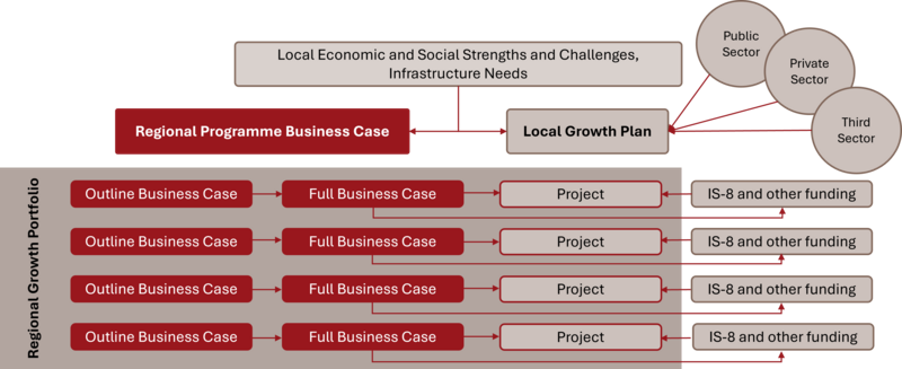Unlocking Regional Investment: The Role of Local Growth Plans and Place-Based Business Cases
From 2026, Local Growth Plans (LGPs)[1], will serve as strategic frameworks for collaboration and investment to stimulate economic growth in regions. They will be owned and delivered by Mayoral Strategic Authorities. Place-Based Business Cases (PBBCs), will be central to understanding and prioritising outcomes from regeneration, housing, education, employment, and infrastructure opportunities, and will be key to unlocking IS-8 funding and delivering the Government’s Modern Industrial Strategy[2].
PBBCs will follow the Five Case Model and Green Book principles. HM Treasury, MHCLG, DfT, DHSC, Police and Crime Commissioners and local authorities will collaborate to ensure joined-up planning and delivery. National bodies like NISTA will support with data on infrastructure assessments and strategic planning.
We propose that Regional Programme Business Cases are an ideal model to guide 10–15-year strategic growth portfolios and enable effective management of a cohesive portfolio of infrastructure projects and programmes aligned with local and national strategies. With the Regional Programme Business Case following the Green Book Strategic Outline Case format, project and programme cases would then be prioritised and progress from OBC to FBC based on deliverability and contribution to regional economic and social outcomes. Stalled projects should be reviewed and reprioritised and halted where there is insufficient future VfM.

Following updated Green Book guidance (expected early 2026), this will require a move beyond traditional cost-benefit analysis to include increased focus on difficult-to-monetise Social Value, wellbeing, civic pride, and environmental impacts on communities, businesses, and citizens. The Regional Programme Business Cases will need to address issues of regional inequality and address aspirations for a more balanced UK economy, through interventions tailored to local needs. Authorities will need to use broader Value for Money (VfM) assessments and social cost-benefit analysis techniques, which are not currently described in the Green Book. The business cases must be evidence-led and focused on specific local conditions.
Community engagement, and collaboration between public and private sectors are essential for legitimacy, local buy-in, and deliverability of programmes. Robust monitoring and evaluation mechanisms are critical to maintain critical mass, pace of delivery, impact evaluation, and accountability.
Local Authorities face shortages in key skills and capacity to develop these robust business cases, particularly in economic and analytical capability. Partnerships with third parties in the private and academic sectors will therefore be critical to help build capacity and capability over time, as well as to understanding the art of the possible in regional economic growth.
If you would like to contribute to our survey on this topic, you can do so here: https://forms.office.com/e/2EYWrYsPd8
GET IN TOUCH
